LATEST NEWS
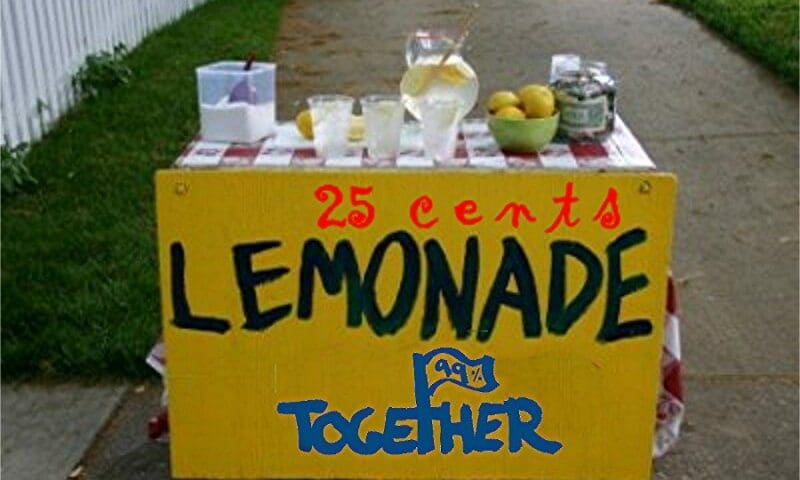

(Note: This post first appeared on Philanthropy New York’s Smart Assets blog.)
By Beth Herz
Leading the charge on an issue can bring an organization’s work into the spotlight—and sometimes also under a microscope. Madeline Janis, Executive Director of the Los Angeles Alliance for a New Economy (LAANE), learned this when her own organization’s work came under scrutiny for less-than-benevolent reasons. While under her leadership, LAANE learned that an unnamed political ops firm was conducting a careful investigation of all of its records, apparently intending to find fodder for a smear campaign.
On November 29th, Philanthropy New York hosted a funders briefing to discuss the rise of this type of political attack on advocacy work and the roles foundations can play in responding. The briefing’s two panels included Madeline Janis’s story and a case study from Cecile Richards, President of Planned Parenthood.
» Read more about: How to Fund Advocacy in Polarized Political Times »


El Segundo city manager Doug Willmore didn’t know who he was messing with.
In January, 2012 the L.A. Times reported that El Segundo, home to a huge Chevron refinery, was considering raising the oil giant’s taxes to help meet the demands of a growing town. Refineries around the state pay far higher taxes to their local governments than Chevron does – which is why Willmore figured the proposal made sense.
Chevron’s El Segundo tax bill is $5 million, far less than other cities receive from their refineries. Torrance got $9.8 million from Exxon Mobil and Carson got $10.2 million from BP. Chevron paid $15.4 million to Richmond for its Northern California facility.
Chevron, of course, wants to hold on to its growing profits and is fighting hard against any tax increase. When the proposal first came forward Chevron reacted with disbelief that the proposal would be made public before they knew about it.


It’s about 6 p.m. and I’m speed-walking to the Seventh and Figueroa Red Line stop to make sure I catch the train after work. At 6:10, the train promptly arrives at the platform and I’m home in 12 minutes. Fortunately, I never have to think twice about hopping on that train or worry about whether the train will shut down or collapse. I also have a convenient alternative to sitting in traffic, and while riding the train I feel secure knowing that our subway system was safely built by skilled hands thanks to government investment in our transit system.
But with the state of the economy and all the talk about the decline of our infrastructure in the United States, I wonder if I have taken what public transportation we have for granted. Then I say to myself, “I’ll cross that bridge when I get there.” (Pun may or may not be intended.)
Here in Los Angeles,
» Read more about: How Congressional Gridlock Is Wreaking Havoc on Our Streets »
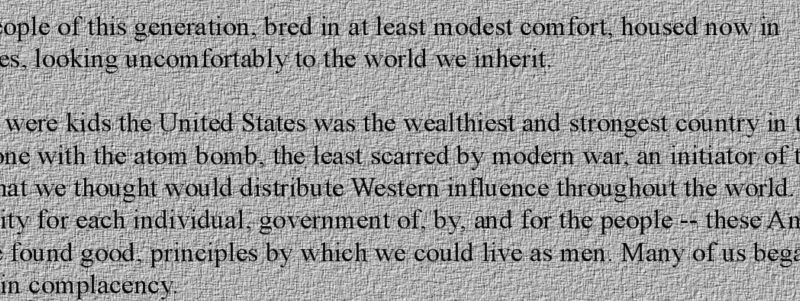
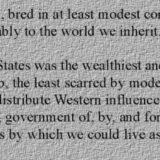
Recently I was invited to speak at a conference marking the 50th anniversary of the Port Huron Statement. Never heard of it?
In 1962, at a United Auto Workers conference center in Port Huron, Michigan, about 60 student activists collectively hammered out what they named an “Agenda for a Generation” with the strong belief that this document could help create the world they hoped for. “We regard men as infinitely precious and possessed of unfulfilled capacities for reason, freedom, and love,” it optimistically declared.
Most were in their 20s, several veterans of civil rights sit-ins or campaigns to end the nuclear arms race. Participatory Democracy was the overall framework – a political vision in which people have power over the decisions that affect their lives. In all-night sessions they argued about wording and emphasis and produced a document that addressed the major challenges of unrepresentative politics, a profit-driven economy and inequality at home and abroad.


“James, would you mind driving me to Wal-Mart?”
Ugh.
My mother-in-law asked me this question on a day when my wife was at work and I was desperately trying to get some writing accomplished. I knew it was going to be a tough week to entertain, long before Gerry arrived — a clash of union meetings, picketing and writing classes at Bergamot Station in Santa Monica.
I was typing at the computer in our small, one-bedroom apartment when she posed the question to me. I tried not to overreact, but I’m sure my eyebrows constricted tighter than I had intended.
“Wal-Mart?” I replied. “You want me to drive you to . . . Wal-Mart?”
She nodded. “I’d like to go the garden center and pick up some things.”
I didn’t want to drive to Wal-Mart, but when it came down to it I decided I would rather be on the wrong side of my union than on the wrong side of my mother-in-law. » Read more about: My Mother-in-Law’s Wal-Mart Moment »
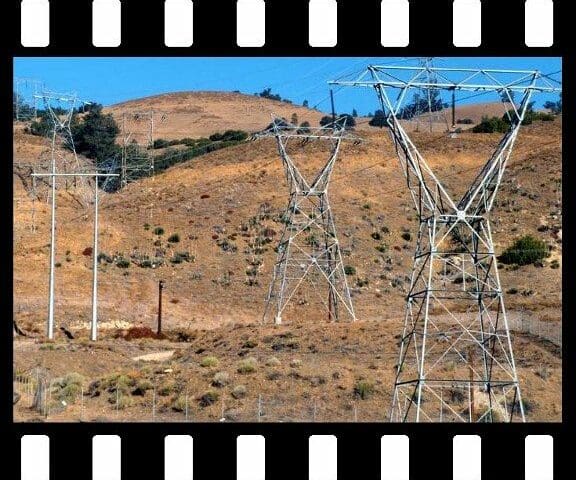

George Garrigues/Wikimedia
The emergence of Los Angeles as one of the world’s great cities, despite its location in a resource-stressed desert basin, has always been the surprise outcome of an unnatural act. L.A.’s stunning growth has been fed by a vast network of electric transmission wires that have, for 100 years, drawn in power from around the West to fuel the always-enlarging economic engines of the city.
This form of urban nourishment has been orchestrated by the city-owned Department of Water and Power (LADWP), which has historically provided L.A. with extremely reliable power at an unusually low price. But now, like utilities around the nation, the DWP is facing serious challenges.
First, the DWP will have to provide more and more power to the city. The population of Los Angeles is going to keep expanding, and with technological innovations like electric vehicles, the need for power will only increase.
» Read more about: DWP’s Power Struggle and the Future of LA »


The U.S. Supreme Court’s recent decision declining to hear an appeal of the L.A. Grocery Worker Retention Ordinance sparked protests from the California Grocers Association. The CGA claimed that the ordinance, which protects the jobs of grocery employees following an ownership change, will do more harm than good in communities suffering from lack of access to healthy food options. Dave Heylen, speaking to the L.A. Business Journal on behalf of the CGA, had this to say: “Our industry and community health groups have long been working to bring more stores into these underserved areas.”
Since when?
For decades, as grocery stores fled South and East Los Angeles, community groups demanded answers from the industry, only to hear the same refrain over and over again. “It’s too difficult to operate in poor neighborhoods.” “Costs are too high.” The Los Angeles Community Redevelopment Agency,
» Read more about: Grocers Association Fights Food Deserts! Really? »


(Note: Brian Beutler’s post first appeared on Talking Points Memo. Frying Pan News presents it here as a snapshot of the Congressional fight over the future of America’s social safety net and does not intend it to be an endorsement of one political party or criticism of another.)
The GOP’s accession to reality on the payroll tax cut is being cast as a key victory for Democrats and President Obama. Republicans caved, the payroll tax will almost certainly be renewed, and the economy won’t take a tough hit just as the recovery’s beginning to accelerate.
But it also reveals a flaw — a potentially huge flaw — in the conservative movement’s generational strategy to roll back the federal safety net.
These might sound like two wildly disparate issues, but they’re actually variations on a years-long theme.
» Read more about: Payroll Tax Cut to Extend; Entitlement Fights Loom »
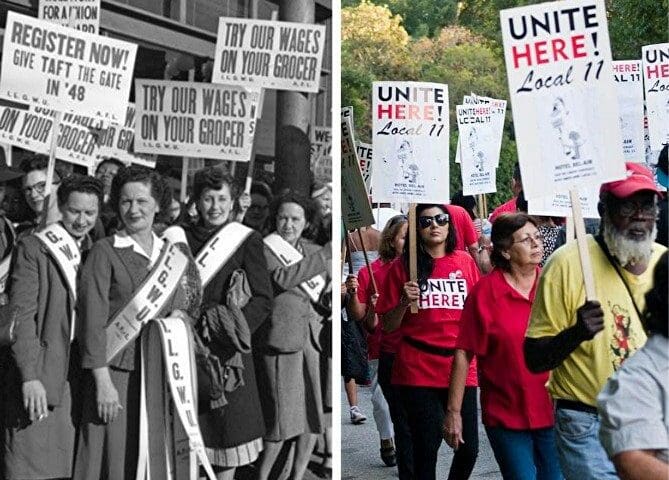
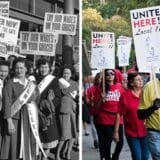
(Note: This January 27 post by David Madland and Nick Bunker appeared on the Center for American Progress’ Action Fund blog.)
The Bureau of Labor Statistics, or BLS, data released today on the union status of the American workforce in 2011 show no growth in union membership—a troubling sign as the nation debates how to strengthen the middle class. That’s because unions help strengthen the middle class by giving workers a voice in the economy and our democracy. Yet the fact that union membership didn’t significantly decline—even amid a weak economy and harsh political opposition—is a significant accomplishment and offers some hope for the future.
Overall, the BLS figures show that the union membership rate fell from 11.9 percent in 2010 to 11.8 percent in 2011, but the difference is so small that the rate effectively stayed the same.
» Read more about: Unions Are the Foundation of America's Middle Class »


We know it’s last-minute, but for those wishing to celebrate Valentine’s Day with a tip of the hat to labor, the folks at L.A. Labor 411 have a list of businesses you may be in need of February 14 that proudly fly the union label. The following are a representative sampling from some select categories.
Ghirardelli Chocolates
Hershey Chocolate
Hershey Kisses
Russell Stover Candy
See’s Candies
Godiva Chocolates
Albertsons
El Super
Gelson’s
Ralphs
Stater Bros.
Vons
United States Postal Service
UPS
Encounter Restaurant LAX
La Scala
Musso & Frank Grill
Beverly Hilton
Doubletree San Pedro
Fairmont Miramar
Renaissance Hollywood
Sheraton Universal
Westin Bonaventure


“Creative destruction” has been widely invoked again since Newt Gingrich began attacking Mitt Romney’s record at the private-equity firm, Bain Capital. Of course, the term is a perennial favorite with business writers. But in response to Gingrich’s attacks, Romney and his allies have insisted that Bain exemplifies “creative destruction,” the closely-linked glory and pain of unfettered capitalism.
“Creative destruction,” the concept, however, carries a more mixed message than many of Romney’s defenders may think. In fact, it points to deep problems that face conservatives whenever they argue that ordinary people should look past the ugly and brutal side of economic life. The phrase was first used by the Austrian economist, Joseph Schumpeter, in his 1942 book, Capitalism, Socialism and Democracy. It referred to a phenomenon Schumpeter had been writing about for decades, a process bound up with entrepreneurship and innovation.
Entrepreneurs, Schumpeter argued, were no ordinary businesspeople. Entrepreneurs were visionaries,
» Read more about: Romney's Resume: Who’s Creative? Whose Destruction? »


It seems inevitable that national coverage of the Occupy movement has been dying down. The sporadic stories I read are of arrests of occupiers in different cities, but I surmise that this too will eventually become old hat in the media and we will soon settle our attentions wholeheartedly on the presidential election, which in my opinion is a real shame.
I’ve grown weary of our gerrymandered elections. For a country that holds freedom of choice so dear to American life, I find it odd and disheartening that we are really only given two parties to choose from. The consumer in me gets depressed every election cycle. It’s akin to going to Ben and Jerry’s and being told that you can only have chocolate or vanilla.
My sincere hope is that this year the narrative is different. I am pinning my hopes on the Occupy movement to resurrect itself to the national news media and overshadow our fixed-choice election for the presidency.


(This post originally appeared February 8 on the author’s Switchboard blog.)
Yesterday, the Bureau of Sanitation for the City of L.A. released its recommendations for fixing the inefficiencies in L.A.’s waste system. After more than a year of careful consideration, the Bureau determined that an exclusive franchise system with 11 franchise zones for the commercial and multi-family sectors would provide the best solution to increasing recycling and minimizing the burden that waste collection imposes on L.A. residents.
As I have written before, the commercial and multi-family sectors are responsible for approximately 70 percent of the waste L.A. sends to landfills, so it is an important nut to crack to meet the City’s zero waste goals. I have written several blogs on this issue and on the benefits of going to zero waste ranging from reducing our dependence on polluting and space hogging landfills to reducing our greenhouse gas emissions to creating more jobs.
» Read more about: Big Step Taken to Resolve LA's Trash Crisis »

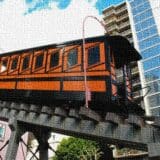
(This post first appeared as a Los Angeles Times opinion piece.)
Last week, one of the country’s oldest and largest public economic development programs came to an inglorious end when the governor and Legislature pulled the plug on California’s 400 redevelopment agencies.
So why did the governor and lawmakers end the state’s only real community revitalization program, especially at a time when there is such great need for jobs and affordable housing?
The biggest reason was the desire of local governments and the state to use the programs’ resources — about $6 billion a year statewide — to fill budget holes. But part of the fault also lies with the agencies, which never fully articulated a mission or resolved tensions between public purpose and private profit.
The purpose of redevelopment, laid out in the original law authorizing it, was to “eliminate physical blight,”
» Read more about: California Needs a Redevelopment Reboot »
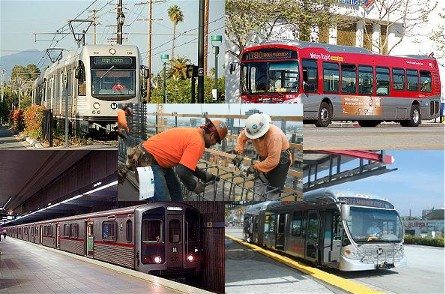

By Maria Elena Durazo and Denny Zane
(This feature first appeared on the Huffington Post.)
While Washington, D.C. has been stuck in what amounts to a partisan traffic jam on the 405 at rush hour, unresponsive and unwilling to rebuild our national economy and infrastructure, we took matters into our own hands in Los Angeles.
In November of 2008 business, labor and environmental organizations of Los Angeles County worked together to sponsor Measure R, a half-cent sales tax increase to fund transportation projects throughout the county. When voters overwhelmingly approved Measure R, they may have been looking primarily for solutions to traffic congestion and air pollution, but they succeeded in approving nearly $40 billion over 30 years to create hundreds of thousands of jobs as well as an economic stimulus for Los Angeles.
In addition, Mayor Villaraigosa is working hard to convince the federal government to create a program of low-interest financing for Measure R’s transit program to accelerate the implementation of those projects over 10 years,
» Read more about: “R” Is for Recovery: 23,400 Jobs Coming to LA Metro »


It’s not known if the Tea Party will ever be identified by one color, the way our two dominant political parties are. With red and blue already taken, it’s tempting to guess that the Tea Party would embrace – well, white. In any case, it won’t be green. Consider a February 4 New York Times piece, which spells out the tireless campaign waged by the movement against any legislation tilting toward a sustainable environment. Some of the laws vehemently contested include:
The reason for Tea Party opposition to these seemingly uncontroversial undertakings is a deep suspicion of an obscure and nonbinding United Nations resolution passed in 1992.
» Read more about: Tea’d Off! Why the Baggers’ Grassroots Aren’t Green »


Last week economist Manuel Pastor and I went to talk to the L.A. Times editorial board about the importance of “updating” its position on living wage policies. The week before, the Times had written an editorial in support of the MTA construction careers policy, but at the same time criticized living wage policies as part of “a long and mostly unsuccessful history of using public resources to try to engineer positive social outcomes.”
Over the years, the L.A. Times editorial board has written at least a dozen editorials criticizing the various living wage policies adopted by the city and county of Los Angeles as job killers, bad economic policy, government interference with the market and many more names.
One of the things that I have written about before is that living wage policies in Los Angeles have actually been very successful.
» Read more about: Getting the Living Wage Message to the LA Times »
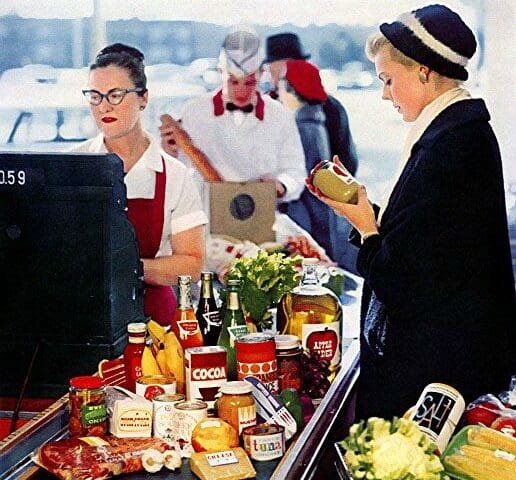

Seven a.m. My alarm jolts me out of a deep slumber. I make my way to the bathroom and run a hot shower. Fifteen minutes later I proceed to the kitchen to start my morning coffee, Dunkin’ Donuts coffee, to be exact. I fill my cup and open the fridge to get some milk. No milk! My morning ritual comes to a grinding halt. No relative drank it all and placed the empty container back in the fridge; I’m just incapable of keeping my fridge stocked. I consider running to the supermarket, then realize that the nearest one is a mile away. I grudgingly put on a coat and walk two blocks to the corner store. I walk past the tiny aisle of wilted lettuce and mushy tomatoes to the combination dairy-alcohol case. I groan audibly. The shop only carries gallons of whole milk for almost $5 a gallon. Thank goodness I’m only out of milk.
» Read more about: Hey LA, Where’s the Beef? And the Broccoli? »


Mr. Frank McCourt
Los Angeles Dodgers LLC
1000 Elysian Park Avenue
Los Angeles, CA 90012
Dear Frank,
In my 17 years, I’ve been to over 150 Dodger games. I’ve never seen them better than in 2009, when they defended the National League West title and played the Phillies in the NLCS. You were owner then, remember? Remember Mannywood? We swept the Cardinals in the Division Series. So much promise, so much hope.
Of course, it didn’t last. The day before we played the Phillies in Game One, you and Jamie announced you were getting divorced. I never understood how you thought that was a good idea, to announce it that day. We lost to the Phillies in five games.
And the unraveling began. You fired your wife. We found out neither of you paid any income taxes from 2004-2009. You had the Dodger Dream Foundation pay your friend $400,000 in one year.


By Jennifer Medina
(Note: This feature appeared on the New York Times Web site February 1.)
CLAREMONT, Calif. — The dining hall workers had been at Pomona College for years, some even decades. For a few, it was the only job they had held since moving to the United States.
Then late last year, administrators at the college delivered letters to dozens of the longtime employees asking them to show proof of legal residency, saying that an internal review had turned up problems in their files.
Seventeen workers could not produce documents showing that they were legally able to work in the United States. So on Dec. 2, they lost their jobs.
Now, the campus is deep into a consuming debate over what it means to be a college with liberal ideals, with some students, faculty and alumni accusing the administration and the board of directors of betraying the college’s ideals.